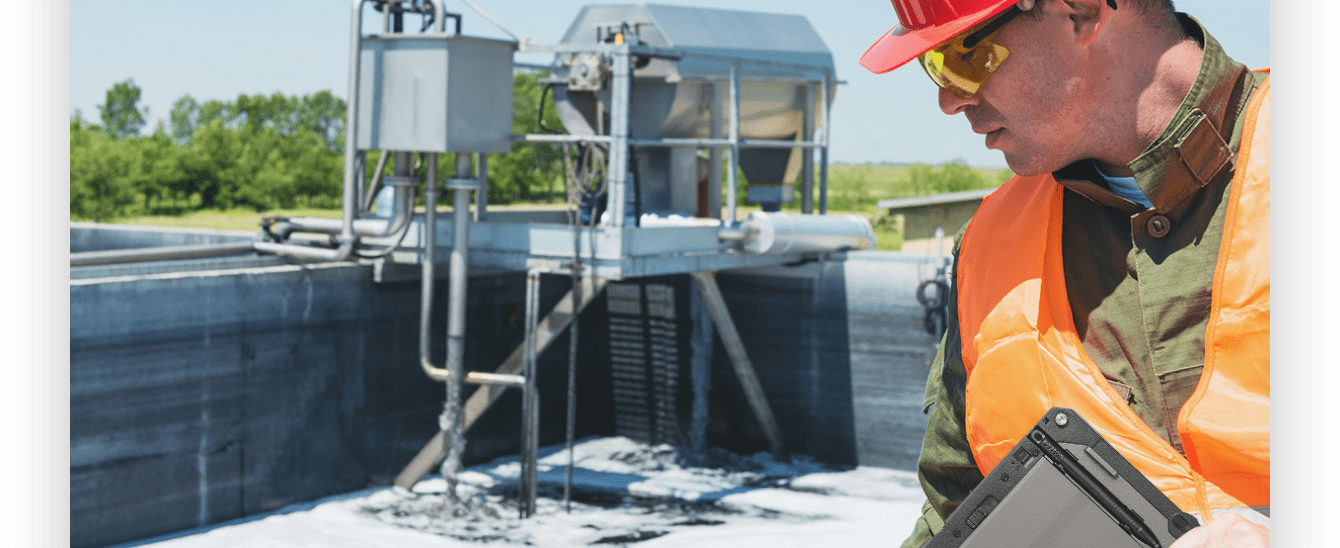Digital transformation isn’t an inside job.

Digital transformation isn’t an inside job. The drive for efficiency is relevant for any organisation that wants to enhance customer experiences, optimise operations and remain competitive in an increasingly technology-driven world. It’s especially relevant for field engineers who operate away from office environments and need reliable access to real-time data and team communications. In these roles, field service engineers often use rugged technology due to the demanding and often harsh environments they work in, requiring durability, reliability, enhanced battery life, outdoor visibility, connectivity, security and specialised features.
Android is a popular rugged tablet operating system (OS) and its relative share of the market is expected to keep growing. However, when it comes to industry field services where engineers are responsible for installing and maintaining equipment outdoors or away from company premises, Android has even more potential. This is due to the recent shifts in how field service jobs are done, and the recent evolution and diversification in the form factors that offer it.
What Field Services Need In A Rugged Tablet
Any viable rugged field service tablet needs MIL-STD-810H (formerly MIL-STD-810G) and IP65 or higher certification. This ensures the device can survive and operate under the stresses it’s likely to encounter in tough environments. It also needs to tolerate drops from 4 feet or higher. If you work in a sector that presents a risk of explosive atmosphere, having intrinsic safety (ANSI/UL certification) features in your device is paramount.
As a result, that tablet’s touchscreen may also need to do the following:
• operate in wet and/or cold conditions with work gloves or a stylus
• have enough screen space for comfortable use
• have bright enough screen to read under direct sunlight
• have sufficient battery life for a full shift
In a smaller tablet (7-8”), you may be able to get a full shift from a single battery. But if you’re dealing with a larger device with a larger screen, and more functionality to go with it, dual batteries with hot-swap capability (i.e., battery changeout without interrupting operation) would be ideal. There’s also configurability for onboard asset ID capabilities (via barcode scanner or RFID) to consider if needed.
Why Android for Field Services?
Most of the general strengths of Android as an operating system relative to Windows can be classified into three areas for field services.
Android is Intuitive
The Android operating system (OS) is easy to learn and easy to use. Many of us already carry around Android devices in our pockets. As a mobile-first operating system, Android is designed for the simple one-touch completion of many tasks. Many digital natives, who are becoming an ever-larger percentage of the field service workforce, are already accustomed to this OS for all-around productivity.
Android is Open & Flexible
There are thousands of certified enterprise-ready applications for the Android OS. Its open nature enables field service providers to easily develop their own apps. What’s more, much newer peripheral and Internet of Things (IoT) devices are mobile-first and Android-compatible. Together, this enables agile and adaptable field service operations.
Android is Power Efficient
The Android operating system and the mobile rugged devices intended to run it are both designed for power efficiency. This makes it easier to extend operation to a full shift, or beyond. As we increasingly depend on our devices for more tasks, there is a much-needed demand for safety, especially in hybrid and remote work scenarios. Android can be a viable option for this requirement.
Android Can Help Make Field Service Safer
The last few decades have seen major advancements in worker safety. However, accident rates in field services were a mixed bag in the 2010s.
The effects of the pandemic on field service accident rates are not yet clear. What we do know is that the pandemic has changed how we work. It has accelerated certain trends that were already happening, many of which are bound to have an impact on safety.
Large-scale workforce retirements happened and are still happening. This has led to organizations hiring new workers, though often not enough to keep pace. Such phenomenon gave rise to heightened accident risks where jobs once done by teams or pairs are increasingly being done by individuals.
Numerous studies have indicated that human error, neglect of safety procedures, and inadequate training can be major contributing factors to industrial accidents. Android—thanks to its low power consumption and developer-friendly nature—can be particularly helpful in addressing these problems.
Remote Monitoring
Sensors/detectors and wearables both ranked in the top five based on a survey of technologies used by health and safety professionals. Experts use these devices to monitor workers’ vitals, look for signs of fatigue or inattention, and detect unsafe work practices. Due to its mobile nature, Android can facilitate adoption, while also making available a wide variety of apps to supplement or develop yourself.
Virtual/Digital Training
Another example of the pandemic’s impact on workplaces is the increasing shift to onside learning via video-based training and remote guidance.
Today, remote guidance might involve a senior person at headquarters giving spoken instructions to a junior person in the field. Augmented reality-based guidance is waiting in the wings. Edge computing has enabled real-time in-context instruction and real-time prompts/alerts when something is wrong, or if safety procedures are ignored. With all these battery-intensive capabilities, Android’s power efficiency becomes even more attractive.
By using rugged technology, field service engineers can rely on durable and reliable devices that are purpose-built for their demanding work environments. These devices enable them to stay connected, access critical information, and carry out their tasks efficiently, even in challenging conditions.
